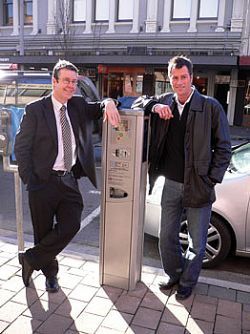On your side
Behind every fast-growing business you’ll almost always find an enthusiastic support partner. Glenn Baker looks at the many support options for business owners and discovers some great mentoring partnerships.
There’s an old saying that goes ‘behind every great sports team there’s an equally great coach’ – and the same can be said about businesses. Today there are not many people who will attempt to start-up or indeed grow a business without the support of a third party advisor. ‘Who’s your mentor?’ has become a standard question in networking circles. Of course, go back ten years, and that question would likely have been greeted by a blank stare or the response perhaps ‘my accountant’ or ‘my lawyer’. Purely by default. Since the turn of this century there has been a steady proliferation of business consultancies and coaching organisations in New Zealand – along with Government-funded agencies and industry-related bodies that offer all manner of support services and training. This is a good thing – provided you find support that’s appropriate to your business, and is affordable . Unfortunately the adage ‘you get what you pay for’ doesn’t always apply. The options are many if you are genuinely looking for help with your business – we’ve listed the majority of them in a ‘supporters box’ on the page opposite. To highlight how to maximise your relationship with a business supporter (aka coach, advisor, consultant, mentor), and how to make your partnership a success, we’ve also identified some great existing partnerships and trust these will provide that incentive to pick up the phone and seek your own support. The right fit Great support partnerships are all about ‘the right fit’ – as Alex Valentine, MD of Albany-based Allco Agencies, an importing and distribution company for the construction industry, points out. Valentine says he has always enjoyed a “comfortable relationship” with his business advisor, Bruce Taylor of Advantage Business Ltd, right from day one. Valentine took over ownership of the company three years ago with another business partner, and a year later, with a view to restructure and grow the business, engaged the services of Taylor. This was despite a tight cashflow situation the company was experiencing at the time. Two years on, with turnover up significantly and staff numbers doubled, Valentine has only good things to say about the arrangement. “Bruce came with a great deal of business knowledge and delivered on his promises, and there has been minimal paperwork,” he says. “I like that.” Valentine admits he drives the relationship fairly hard (he uses the term ‘maximise’) and currently consults with Bruce at least twice a week. “Bruce is a very good filter, a great sounding board – and he knows our business. And while we may disagree on occasion, his information and help is invaluable for us when it comes to making decisions. He also holds us accountable for our forward planning – keeps us right on track.” The company is making more money, but Valentine says there have been additional benefits too – such as improved staff relationships. But most of all he loves the fact that Bruce is just as passionate about the business as he is. “We feed off each other. He’s part of the business.” For his part Bruce Taylor is somewhat modest about his role in Allco’s growth. “Alex has a huge level of enthusiasm and passion for both products and staff, and this means it’s possible to achieve anything with the company,” he says. “It has been an absolute pleasure to work with him and see the transformation as we’ve worked through the programme.” Taylor says his initial task was to assist with issues surrounding the director’s roles, goal setting, staff motivation and organisational structure issues. This was after conducting customer and staff surveys, and a comprehensive analysis of both the company’s internal functions and external operating environment – to gain a clear understanding of ‘where things were at’. “My biggest contribution, I believe, was being able to inject some clarity of vision – particularly with individual roles and responsibilities – helping management to operate more at a governance level and concentrate on strategic issues.” Successful support partnerships all come back to commitment, says Taylor. “We set the overall goals of the programme with Allco – which go forward five years – but are broken down into 12 month and quarterly goals. Our twice monthly meetings are centred around the tasks that will achieve each quarterly goal. There is not a lot of theory – most of it is practical advice.” Taylor is conscious of the fact that many business owners can feel somewhat overwhelmed by a support programme instigated by their business advisor. “That’s why our role is to break everything down into small, manageable steps. Company owners and managers are already working up to 50 hours a week – they don’t need any added burden to cope with.” Buckle up for a rough ride If ever there was a time to enlist third party support for your business, it’s now. Business support will be more vital than ever in 2008, says Ben Ridler, who heads The Results Group, a provider of business coaching for larger-sized, privately-owned companies and a specialist in exit strategies. The current credit crisis will especially impact SMEs (small and medium enterprises) and their financial situation. Banks are pulling back, says Ridler, their risk aversion is up and subsequently it’s getting harder to access business finance. “Business prices are plummeting, which ultimately impacts on your ability to sell your business.” He says business owners need a coach or advisor more than ever to grow the business and plan for the future. Ridler has seen things turn quickly sour for owners who don’t plan for organised succession. He knows of one who, through ill health, was eventually forced to give away a substantial company built up over years – a company that could otherwise have been worth millions. But he warns that it’s not enough to just have a succession plan. “Implementation is the hardest part, and coaching is an effective mechanism for achieving that.” Ridler, who is also the current president of the New Zealand Chapter of the Entrepreneurs Organisation, believes that Gen Y and Gen X business owners particularly require regular coaching, because they are used to a more interactive form of learning. His view is that good business support consists of a mix of consulting disciplines, but is implemented through coaching, and is all about holding people to account. So has the local business coaching market become too commercialised? Far from it, believes Ridler. “If anything, I’ve been at the forefront of the industry’s commercialisation, and the reason I’m all for it in New Zealand is that it’s still not being done very well. He admits that the business coaching industry still has a lot of maturing to do, particularly if it wants to attract high-calibre professionals with competitive remuneration. He’s keen to raise the bar and see some mandatory industry accreditation in this country. [The IABC (Institute of Accredited Business Consultants) currently provides accreditation, registration and professional development for small and medium sized business consultants in New Zealand and is supported by NZTE. However membership is entirely voluntary.] Meantime, Ridler’s company must be doing something right for its clients, with Results Group taking out the Vero Excellence in Business Support Award in the Under $5M One on One Offering. Seek help early “As a business owner I was too busy to do something different, or thought I would work it all out myself,” recalls Ridler. My advice to others is to get support before you end up in business A&E. Ridler doesn’t think compliance issues are the big problem with business ownership in this country – “the problem is usually us, the owners. “It’s simply too easy to start-up a business in New Zealand – the entry level is too low. There’re people with next to no business or financial education running businesses. Not surprisingly there are thousands of business failures every year and the fallout from that is enormous as people end up with bigger mortgages and nothing to show for it.” The emphasis should be on quality of businesses, not quantity, he says. As with sports, if you want to be a high performer, get a coach. “As a business grows its owner must morph from a technician to a manager and then a leader – unfortunately most entrepreneurs are natural leaders but know little about management,” says Ridler. This is where a coach or advisor can help most he says. Ridler, now aged 36, has seen the industry from both perspectives, having been a client of Results long before he became a shareholder and its managing director. He’s adamant that if a business doesn’t have a board of governance, it needs a coach. “An external person who will challenge your thinking and ensure that once you have a business plan, that you stick to it.” Coaching from start-up While most coaching and mentoring agencies prefer to work with businesses that have been trading from 12 to 24 months, Christchurch-based company Orlova South Ltd was an exception, largely due to the owners’ previous business experience, their $500,000 commitment to the new business, and their mentor’s taste for challenges. Richard Sturzaker had owned a company installing ‘SolaTubes’, his wife Raewyn had been assistant hotel manager on a cruise ship, and together in 2005 they came up with the idea of running a luxury tour coach business around the South Island. They were influenced largely by the fact that people whom Raewyn had met on the cruise ship were constantly after her to organise accommodation and tour arrangements around the ‘mainland’. To cut a long story short, it took three years before their first coach was ready for the road, and Orlova South wasn’t launched until January this year. But this is no ordinary coach – this is pure luxury on wheels for up to 12 pampered tourists, with all the ‘bells and whistles’ right down to swivelling leather seats. Go to www.orlovasouth.co.nz and see for yourself. The Sturzakers spared no expense on design and marketing for their business, and met business mentor Sharon Lingham through a business planning course organised by the Canterbury Development Corporation (CDC). Jill Taiaroa, Mentor Co-ordinator for Business Mentors New Zealand’s Canterbury agency CDC, performed the introductions. The fact that Orlova South wasn’t trading meant they were ineligible to attend a website design course (which they only discovered half-way through the course) and, strictly speaking, ineligible for mentoring! However, Lingham was prepared to take them on; it seemed to be the perfect match, particularly due to the fact that Lingham co-owns Crown Limousines NZ Ltd, a leading Christchurch based limousine hire company, as well as a limousine manufacturing company. The Sturzakers found their mentor invaluable for guidance and for opening doors. “We’re in contact by email on average once a fortnight – usually looking for a response to an idea of ours,” says Raewyn. “It’s great because even though we know the ultimate decision is ours, Sharon will always provide us with all the positives and negatives.” Lingham draws on her extensive business experience in retail, wholesale, manufacturing and marketing to guide her clients, and definitely does it “for passion, not profit.” Early on in the relationship, she was able to help the Sturzakers sort out a budget blow-out by the coach builders and a delivery schedule that had gone from nine weeks to 29 weeks. Lingham was able to install confidence in the Sturzakers to approach the manufacturers head-on regarding the blow-out and armed with a well laid out document of facts and figures they saved themselves several thousand dollars. “Initially Richard and Raewyn were a little apprehensive [about our mentoring arrangement], as I was also in the transport industry – but mutual trust was quickly established. They could see I was there only to help them,” recalls Lingham. “The relationship worked mainly because right from the start they were able to realise that their situation had to change – they had invested so heavily – and I was there to offer advice. And yes, I had to prompt them from time to time – it is a two-way affair.” Lingham says she is impressed by the Sturzakers and will continue to look out for opportunities for Orlova South. She believes mentoring partnerships work best when there is confidentiality (“all support agencies and mentors should encourage this”); mutual trust; clear two-way communication; and a willingness to take initiative and act on advice. “And if you do not feel comfortable with a mentor, contact your co-ordinator or agency at once.” The Sturzakers believe it’s important to secure a mentor involved in a similar industry to yours, and they hope they can continue working with Lingham for as long as possible. In their five-year plan is another new coach (to maintain Orlova South’s Five-Star Qualmark rating) – and yes, there is an Orlova North on the drawing board. It just goes to show that a little business support can take you a long way. Websites applicable to this article include: www.advantagebusiness.co.nz www.results.co.nz Glenn Baker is editor of NZBusiness.




